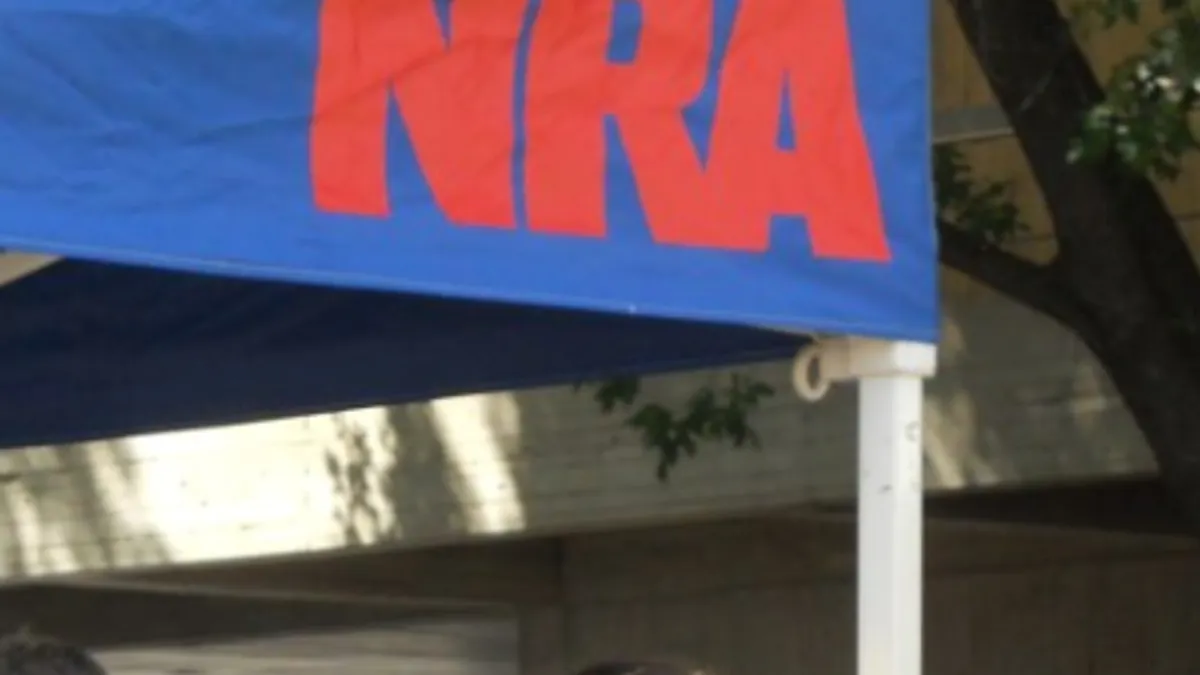Lax financial controls, which allegedly enabled the National Rifle Association's top officers to set their compensation and use funds for personal expenses without following the group's bylaws and in accordance with law, are central to the lawsuit filed last week by New York State Attorney General Letitia James to dissolve the association.
Included in the lawsuit are charges against the group's top officers, including its executive vice president Wayne LaPierre and former Treasurer and CFO, Wilson ("Woody") Phillips, of being "false fiduciaries" and enriching themselves at the expense of the group's charitable mission.
Among the financial improprieties alleged is a pass-through financial arrangement Phillips is said to have created that hid officers' expense reimbursements by charging them to NRA’s largest vendor, which billed the NRA in return.
"This practice evaded both the NRA's own accounting and Board-established expense reimbursement process, and IRS requirements for proper expense reimbursement," the lawsuit alleges. "LaPierre, Phillips, and [Executive Vice President of Operations Joshua] Powell regularly used this pass-through arrangement to conceal private travel and other costs that were largely personal in nature, wasting substantial charitable resources and exposing the NRA to millions of dollars of potential liability for violation of IRS reporting requirements."
The NRA in a statement called the lawsuit a "baseless premeditated attack on our organization and the Second Amendment freedoms it fights to defend... we not only will not shrink from this fight — we will confront it and prevail."
Long-time officers
LaPierre has been with the NRA since 1978 and its top officer since the early 1990s. One of his first actions as executive vice president was naming Phillips CFO, who, the lawsuit alleges, failed to adhere to internal financial controls and misused NRA assets to enrich himself and other NRA officers and directors. Phillips retired in 2018.
According to the complaint, accountants in the NRA's financial services division (FSD) were frequently directed to process payments in contravention of NRA policy on the basis that "Woody wants this done," or "Wayne [LaPierre] or Woody or Josh [Powell] said that these are okay."
Several of Phillips' staff became whistleblowers in the summer of 2018, disclosing to the NRA Audit Committee longstanding failures by NRA senior executives, including Phillips and Powell, to comply with NRA financial policies and procedures and to ensure adequate internal controls.
The 164-page complaint outlines dozens of financial arrangements that either violate the law and the group's bylaws or bypass financial controls and represent a misuse of funds.
For example, LaPierre's annual salary, which averaged about $2.5 million in recent years, was allegedly set without proper vetting by the organization’s Officer’s Compensation Committee and inadequately reported because it didn’t include his and his family's personal travel, among other perks.
"The NRA Board set the compensation for LaPierre, Phillips ... during the period 2015 to 2018 without relying upon or properly consulting a compensation consultant, considering reliable compensation surveys or obtaining appropriate comparability data," the complaint said. "The Board also did not maintain adequate documentation of the process of determining officer compensation."
Pass-through entity
The problematic pass-through arrangement Phillips is said to have devised involved a public relations company called Ackerman McQueen and one of its subsidiaries, the Mercury Group.
Ackerman provided the NRA public relations and marketing work that included event planning, Web design, social-media engagement, and digital-content production, and was also involved in developing and marketing NRA Carry Guard, a defensive gun use program, according to The Trace.
From the time LaPierre took over the group's leadership in the early 1990s until 2018, when Phillips resigned, Ackerman was the NRA's largest vendor, billing the organization $50 million for work done in 2017 and 2018 alone. During that two-year period, Ackerman billed the NRA an additional $18 million for expense reimbursements, the complaint said.
A portion of those expenses were incurred by NRA officers, who would seek reimbursement from Ackerman, which would then submit to the NRA for reimbursement.
"The NRA used this arrangement to conceal expenditures by NRA executives ... many of which were personal or lacked documentation required by IRS publication 463 to permit the NRA to avoid reporting such expenses as taxable income," the complaint said.
"The effect of the pass-through expense arrangement was that these expenses would be paid for by the NRA without written approvals, receipts, or supporting business purpose documentation in accordance with NRA policies and procedures, and without disclosure to or internal review by the NRA FSD [Financial Services Division]," the complaint said. "Payment of these expenses also violated IRS rules governing reporting of income for each of the recipients on their W-2 forms, exposing the NRA to penalties for false filings and for under-withholding of taxes due."
Named officers
The complaint charges the NRA with multiple violations of law and the organization's bylaws. It also singles out claims against individual officers, including LaPierre, who allegedly financed a lavish lifestyle with organization funds, and Phillips, among other officers.
Among the charges against Phillips, when he served as Treasurer and CFO, is an undisclosed conflict of interest he had with a company called HomeTelos, which received $1.4 million over several years from the NRA. Despite having a longstanding personal relationship with the company's CEO, Phillips never disclosed a potential conflict prior to awarding the contract.
The organization's finance staff mentioned the undisclosed conflict as part of their whistleblower action in 2018, the complaint said.
The complaint also highlighted improprieties with the way Phillips and the NRA executed a five-year, $30,000-a-month consulting agreement for compensating Phillips after his retirement.
The complaint alleges the agreement was approved without input from the NRA Audit Committee. Both the chair and vice chair said they don't recall the contract coming before the committee for approval. Phillips has been invoicing for the money, despite allegedly failing to provide any consulting services since departing.
"I don't have direct conversations with Woody about anything," the NRA's current treasurer testified.
The complaint also highlighted a trip Phillips took that included an improperly disclosed week-long stay on a yacht owned by the head of an NRA business partner. LaPierre is also said to have improperly disclosed his use of the yacht.
Dissolution sought
The complaint seeks to dissolve the NRA, which reported about $197 million in assets in 2017, and direct its assets and any future assets to charitable uses consistent with the organization's mission.
"The NRA has exceeded the authority conferred upon it by law, has carried on, conducted, or transacted its business in a persistently fraudulent or illegal manner, or has abused its powers," the complaint said.
It also said individual officers "have looted or wasted the NRA's charitable assets" and "perpetuated the corporation solely for their personal benefit, or have otherwise acted in an illegal, oppressive or fraudulent manner."
The NRA hasn't responded to a request for comment.





















